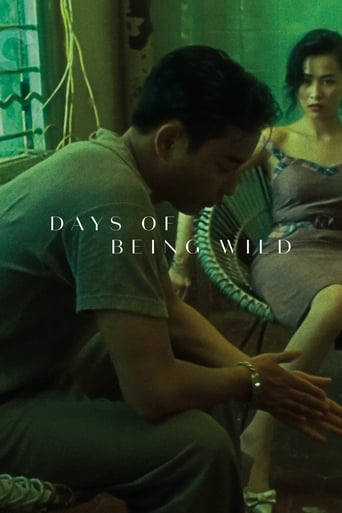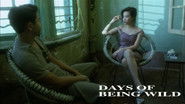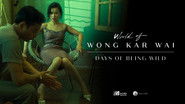ahernz
Include all the movie stars in Golden time of hong kong movies. And Leslie built himself an legendary in this movie as I regarded.
lasttimeisaw
Sophomore feature of Hong Kong taste-maker Wong Kar-wai, DAYS OF BEING WILD is part of the furniture on any list that elects best Chinese films, but in retrospect, it was somewhat of a damp squib upon its release in terms of its box-office pull, especially when taking account of its stellar cast (6 mega-stars in toto), fortunately, its reappraisal has never lost its momentum ever since.Bestowed with searing good looks, Leslie Cheung indubitably holds court as Yuddy, the titular "ah fei", which means "hooligan", a skirt-chaser who callously shirks any responsibility or commitment, and peculiarly, Leslie tempers Yuddy's wantonness with a pinprick of vulnerability that is so amazingly vicarious and betrays what a beautifully damaged goods he is, and Wong's trademark ambient construction of its blue-hued, mise-en-scène (poky space, lustful undertow, ambiguous closeups, plus aesthetic compositions by the yard, marked by his first collaboration with Christopher Doyle) and exotic music numbers impeccably tallies with Leslie's decadent and destructive charisma, to great lengths that one can hardly distinguish whether he is acting or not. Yuddy's victims include a mousy stadium ticket clerk Su Lizhen (Maggie Cheung, exuding an unyielding quality of passiveness and self-involvement that shows up her acting chops), and later a vivacious cabaret dancer Mimi (a no-holds-barred Carina Lau, achingly taking the short end of the stick as a crass, cast-off lover), these two girls are diametrical in their makeups, yet, in the eyes of Yuddy, they barely differ, his misogynistic perspective has its own provenance, raised by Rebecca (Pan), an erstwhile fille-de-joie who perversely keeps a lid on the identity of Yuddy's biological mother, Yuddy revels in their toxic love/hate relationship, which exacerbates through their bilingual (Shanghainese and Cantonese) barbs-exchange, Pan remarkably holds her own with moxie and pathos in this quintessential object lesson of the hand that rocks the cradle. When Yuddy is off screen, the plot meanders into less appealing subplots pairing a distraught Mimi with Zeb (Jacky Cheung), Yuddy's buddy, who carries a torch for her; and a distressed Lizhen with a peripatetic policeman Tide (Andy Lau), who will later become a sailor and comes across Yuddy during the third act in Philippines, as a witness when the latter's fate is sealed by his reckless action. Wong and co-screenwriter Jeffrey Lau lard the narrative with incisive wheezes to decipher Yuddy's existential philosophy, from his one-minute friend pick-up line to the allegory of the feet-less, paradise bird, poetically encapsulates Wong's story-light, mood-heavy winning allure. Lastly, Tony Leung Chiu-wai's famous cameo as the new "ah fei" near the coda seems out of nowhere today, but as a matter of fact, it strongly tantalizes what its botched sequel would be if it would be green-lit, and Tony would become Wong's most eminent leading man ever since. In a sense, it inadvertently adds a strange layer of mystique which drastically boosts Wong's nascent career, and presages his future auteurist ascension, as we would know by now, the best is yet to come.
mahatmakanejeeves420
I guess the main reason that this is my favorite WKW movie is that it's one of the least abstract of his movies and I feel like the viewer becomes more emotionally involved with the characters because of that. The music, as always with WKW, is wonderful and the cinematography is fine, I especially like all the shots of the lush tropical forests. It isn't as beautifully photographed as many of his later films like chungking express and in the mood for love. And it doesn't feature much of the fancy techniques that WKW likes to employ in movies like fallen angels or happy together. Still I think this is my favorite of Wong Kar Wai's movies, not necessarily the best, but the one I enjoy the most. Highly Recommended.
abby135792001
A film for the search of one's own root, own home, about the continuation of the journey for love, it is all the same when people are young and it applies to all people despite the generation gap or changes in the society.Disappointment always emerges after a high expectation is given. Leung finds Yuddy's house is not special after a long-time expectation, it would mean without the initial expectation, disappointment would be avoided. However people would always live with expectation, especially throughout the whole film. So Li-zhen hopes for marriage with Yuddy, Leung Fung-Ying hopes to be together with Yuddy while Zeb hopes to be with Leung, Yuddy wants to get along with his biological mother and Tide hopes to receive the phone call from So Li-zhen. Everyone has his or her own hopes but finally all of them are disappointed.The film name is actually reflecting days of youngsters and frivolity when young people would freely choose what to do without a price. They would not realize the end of life is coming, and they would try their best to go forward to search for more possibilities. No mentioning of responsibility and moral burdens would keep them move on and on, like the birds without legs said by Yuddy in the film.Another recurring theme in Wong Kar Wai's films is the motif of time, which is directly referenced in characters' dialogues, like So Li-zhen and Yuddy built up their relationship by the one-minute to 3 pm while Yuddy and Leung finished establishing their first sexual relation at around 3 am. Yuddy met Tide in the Philippines, and the time was also around 3 am. Both time periods are the same but distinct in terms of day and night. 3 am, or 3 pm, is at the middle of day/night, approaching sunset/sunrise, resembling the period of depravity and disorientation.The sleepless nights of different characters and the dark cinematography of scenes would be evidence of an intoxicating and restless status of the society and people living in there. Tide and So Li-zhen talked the whole night and later he talked with Yuddy when Yuddy wanted to drink until dawn. The static shot shows that time seem not to pass away so easily at these nights; a lot of establishing shots would be used to capture the features of the city (Hong Kong but not Philipines) which expresses a feeling of loneliness in the characters and time of pain and being alone would not easily leave.Remembering and forgetting is not only about the love stories and feelings of the characters, but also the history of the city and self identity. The 1960 setting for the story matches with the old songs featured in the films give audience impression of the era back into the past, the characters and the stories give the impression of youth and energy, they are still in the mood for passionate love with vigor and vitality. The film name also reminds us of an old film Rebel Without a Cause (1955), the era with a forever memorable star James Dean and his image similar with Yuddy. The setting also remind people of classic Hong Kong culture, the dance ball and nostalgic old song in the background, the local unique restaurant where the characters go to have lunch/tea, etc.Search of root is a way to find one's existing value and realize the self identity. The bird without legs is a legend, yet a cruel truth to Yuddy as well. Yuddy could not settle down at home because he was homeless since birth. The love from mother is the element he would never receive in his life. He did not choose to become the birds without legs, but the light steps following music and the shot showing his back without return already drive to the conclusion that Yuddy could only be flying till the end and the scene that Yuddy walk further and further away from the camera hints the character would die with the knot and never resolve his issue.Finally, these love stories are not only occurring in these characters and they would pass along as they are common and all people would be haunted by loving the wrong person or missing the right person. Therefore, the film has allowed a continuity to send us a message about Yuddy's death would not mean his personality's death. Chow Mo-wan's presence would be a metaphor for the society that there are a lot of people like him. In addition, when So opened her mind again and became ready for starting to love again, it has reinitiated the atmosphere for love to enter, meaning hope would continue and the character is still on the ride. Maybe there would be hurt in the journey, however after the event the characters, which resemble you and me, could still stand up and bravely strive for one's own happiness.After all, everyone would experience the same struggle and painful memory in different ages of their life, however, to remember or to forget is up to everyone's free will. Remembering the experience and learning from it would help shape a better handling of relationship in the future while forgetting the feeling would help relieve the emotional burden of your own self.






